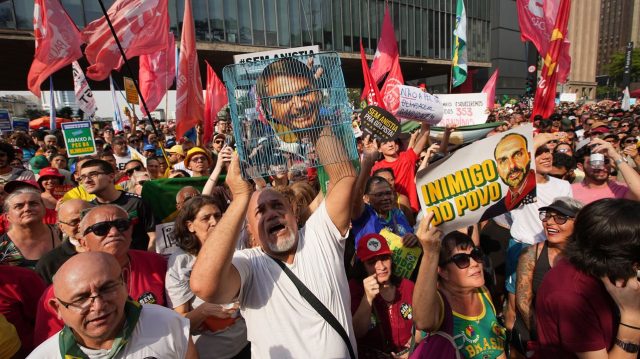
Tens of thousands of Brazilians took to the streets this weekend. They protested controversial parliamentary efforts that would see former leader Jair Bolsonaro pardoned for an unsuccessful coup attempt, as well as raise the bar for future criminal proceedings against politicians. The massive anti-corruption protests, which took place in cities across all of Brazil’s 26 states and federal district, come as Bolsonaro and his allies work to negate his 27-year sentence for his role in the 2023 uprising that sought to overturn his electoral loss to current Brazilian President Luiz Inácio Lula da Silva. Bolsonaro himself is currently on house arrest while his legal team works through the appeals process.
Brazil ‘does not want impunity or amnesty’
Long before the passage last week of a measure — dubbed the “bandit bill” by critics — to potentially grant some form of amnesty to Bolsonaro and his followers, the former president had “touted legislative amnesty” as one of his “political avenues to freedom,” said Reuters. The “legality of such a move,” however, “remains contentious.” Legislative amnesty is a shortcut to “achieving some form of justice,” said Congressman Eduardo Bolsonaro, the former president’s son, to the outlet earlier this month after his father was sentenced.
Not so, said the current Brazilian president commonly known as Lula, on X Sunday. The weekend’s massive demonstrations “show that the population does not want impunity or amnesty,” Lula said. He has also pledged to veto any amnesty bill that comes to his desk.
Estou do lado do povo brasileiro. As manifestações de hoje demonstram que a população não quer a impunidade, nem a anistia. O Congresso Nacional deve se concentrar em medidas que tragam benefícios para o povo brasileiro. pic.twitter.com/qgqQO5lVGISeptember 22, 2025
To Lula’s point, attendance at anti-Bolsonaro protests in both Rio de Janeiro and São Paulo — estimated at 41,800 and 42,400 in turn — was the “highest for a left-wing demonstration” since Lula’s 2022 victory rally, The Associated Press said. Organizers for the Rio event used the “same location where Bolsonaro supporters usually gather, breaking with the tradition of holding rallies downtown” in an effort to “outdraw the pro-Bolsonaro crowd,” said Brazil’s Folha de S. Paulo newspaper.
A ‘shielding bill’ or simply fighting ‘judicial overreach’?
Adding to the already debate over Bolsonaro’s personal and political future is a parliamentary push to pass a constitutional amendment that would, if enacted, significantly raise the bar for future political prosecutions. Under the “so-called ‘Shielding Bill,’” legislators would be required to vote by secret ballot to “give the go-ahead for one of their own to be charged or arrested,” said Al Jazeera. Supporters have insisted the tightened criteria are necessary to combat “judicial overreach,” although both this and any potential amnesty for Bolsonaro will “face an uphill battle” in Brazil’s senate.
All this comes as Brazil finds itself under increased pressure by the Trump administration over both international trade and the treatment of longtime MAGA ally Bolsonaro by the current government. During Sunday’s demonstrations, attendees “not only rejected amnesty and expanded protections for lawmakers,” the AP said, but also stressed “national pride” while defending Brazil’s “sovereignty in response to Trump’s sanctions.”
Efforts to evade consequences for an attempted coup and civic unrest have pushed thousands into the streets






